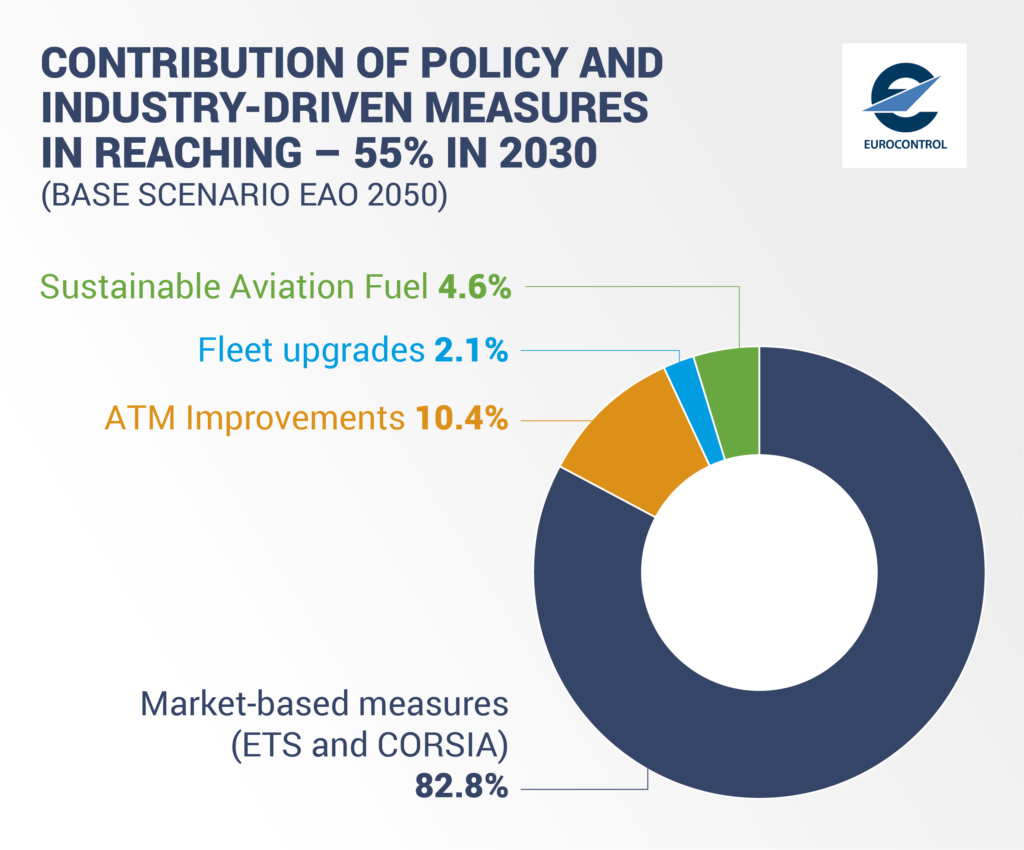With the challenges brought on by climate change and extreme weather conditions, we have to navigate aviation operations in an evolving landscape. It is in our self-interest to deliver on our net zero ambitions, not just for the future of the planet, but for the future of our industry. The more we can reduce emissions today, the less we will have to adapt to tomorrow. As a civil-military organisation, EUROCONTROL supports European aviation with data and expertise and by actively facilitating a collaborative approach to the aviation sector’s biggest challenge ever.
 As outlined in EUROCONTROL’s corporate Raising the Bar programme, understanding how climate change impacts aviation operations and adapting to it, is as much a priority as our comprehensive set of green services that support ECAC Member States and operational stakeholders in their decarbonisation efforts.
As outlined in EUROCONTROL’s corporate Raising the Bar programme, understanding how climate change impacts aviation operations and adapting to it, is as much a priority as our comprehensive set of green services that support ECAC Member States and operational stakeholders in their decarbonisation efforts.
Our flagship sustainability initiative FlyingGreen will be a one-stop shop for these services. It will be set up in a close collaborative process with over 100 representatives from across the aviation sector to ensure their needs are fully met in line with the challenges of tomorrow. One of the four pillars is ClimAdapt, which aims to build aviation’s resilience to climate change through various means such as guidance on climate change risk assessment and adaptation.
Invaluable work here is being done by the European Climate Change Adaptation Working Group which is chaired by EUROCONTROL and ACI EUROPE and joined by 37 partner organisations. Recently we published a guidance document for airports preparing for adverse winter to support them in avoiding disruption of service.
But let’s return to our biggest challenge: Transforming the sector towards more sustainability in the future. In Europe, achieving a 55% CO2 emissions reduction by 2030 (compared to 1990 levels) is a strategic priority. “Can aviation achieve this goal and how much is it going to cost?” was the question we asked ourselves in many discussions with our aviation partners and we have found the answer through the work on our Objective Skygreen Think Paper and companion report. They show yes, aviation can, and the importance of marked-based measures, mainly via the EU Emissions Trading System (ETS) and the Carbon Offsetting and Reduction Scheme for International Aviation (CORSIA), that will make an 83% contribution to the net reduction in 2030.
We have looked closely at the impact of decarbonisation policies up until 2030 to assess the extra cost of Sustainable Aviation Fuel (SAF) uptake, the impact of ramping up kerosene taxes, and the phasing out of free emissions allowances. Our estimates show that the cumulative extra cost of these decarbonisation measures to the aviation industry will amount to €62 billion (between 2022 and 2030) consisting of €29 billion in tax costs on kerosene (applied to intra-EU flights), €23 billion in extra ETS costs (applied to intra-EEA flights + flights from UK &Switzerland), €10 billion in extra fuel mix costs (based on a 5% SAF / 95% kerosene mix in accordance with the European Union’s ReFuelEU Aviation proposal). The extra cost to the airline industry in 2030 alone is estimated at €14 billion. However, improvements led by the industry (operational measures and modernising airline fleets) are capable of bringing the extra cumulative costs significantly down.
 Objective Skygreen is based on the three possible scenarios of our long-term air traffic forecast EUROCONTROL Aviation Outlook 2050 (EAO 2050) which predicts 13.8 million flights across the European Network by 2030 and 16 million flights by 2050 (both baseline scenario) and estimates the impact of industry driven and regulatory measures. Counterintuitively, the high scenario with the most traffic is most efficient to reach net zero emissions by 2050 at lower cost, as higher revenues will drive increased investment in new technology.
Objective Skygreen is based on the three possible scenarios of our long-term air traffic forecast EUROCONTROL Aviation Outlook 2050 (EAO 2050) which predicts 13.8 million flights across the European Network by 2030 and 16 million flights by 2050 (both baseline scenario) and estimates the impact of industry driven and regulatory measures. Counterintuitively, the high scenario with the most traffic is most efficient to reach net zero emissions by 2050 at lower cost, as higher revenues will drive increased investment in new technology.
Until 2030 and beyond the use of Sustainable Aviation Fuel (SAF) must increase
The EU’s ReFuelEU Aviation initiative is essential in enabling a swift ramp up of sustainable aviation fuel (SAF) production and usage in Europe. Directed at fuel providers it requires that conventional kerosene for aircraft is blended with SAF starting in 2025 with 2%, and then gradually increasing to 70% by 2050. The new legislation also includes a sub-obligation for synthetic aviation fuels starting in 2030 with 1.2%, and progressively getting to 35% of e-fuels in 2050.
To avoid fuel tankering and carbon leakage, an obligation is also placed on aircraft operators to uplift at least 90% of the yearly fuel required at EU airports. Increasing the use of SAF in aviation will require significant technological investments, availability of feedstocks and other developments from SAF suppliers. Depending on the SAF production technology pathways, the range of SAF production costs is from €1,000/tonne to more than €4,500/tonne. SAF is today typically two to six times more expensive than kerosene.
Assuming an increased demand will reduce production cost, the extra cost of a 5% SAF blending share compared to 100% kerosene is estimated to be €10 billion by 2030 in the base scenario, reaching €2.6 billion in 2030 alone. The extra costs for increasing the share of SAF are relatively low compared to EU-ETS and kerosene taxation costs. The latter, applied to intra-European flights, will e.g. increase aircraft operator costs by €28.8 billion in the period 2022-2030. Comparing these costs, it is evident that the ReFuelEU Aviation initiative brings net emissions savings at an affordable cost.
Under the EU ETS, all airlines operating in Europe, European and non-European alike, are required to monitor, report and verify their CO2 emissions, and to surrender allowances against these emissions. They receive tradeable allowances covering a certain level of emissions from their flights per year (in 2012, 85% of allowances were allocated for free). In the revision of the EU ETS Directive, the current level of free allowances will be cut by 25% annually starting in 2024, resulting in a complete phase out by 2026. The phasing out of aviation’s free emissions allowances will result in a significant increase of allowances to be auctioned (2024-2030).
Given current political developments and pressure on the energy sector, we have assumed a high carbon price of €200/tonne costing airspace users between €24.1 billion (low traffic scenario) and €19.6 billion (high traffic scenario) between today and 2030. Only if revenue is high will aviation be in a position to put in place the investment needed for the sustainability transition. In fact, operational improvements and fleet upgrades could reduce airline fuel consumption by 9.5%-15.4% in 2030.
To reduce CO2 emissions quicker, accelerated refleeting would result in significant additional CO2 emissions reduction (savings ranging from 1.7% to 5.3% over 2028-2030). We can achieve our goal, but it is evident that besides close collaboration among all stakeholders in the ecosystem a significant scale up of green energy and financing is needed.
In this article EUROCONTROL has emphasized the importance of CORSIA in achieving the region’s net-zero goals, as well as the regional European Union Emissions Trading System (EU ETS). ICAO supports a coordinated global approach to aviation sustainability. While these perspectives may differ, it’s essential to recognize the ongoing efforts of both EUROCONTROL and ICAO in collectively working towards the overarching goal of a sustainable aviation industry.
Sustainable aviation fuels (SAF) are aviation fuels derived from renewable or waste sources that meet specified sustainability criteria. According to technical analysis conducted by ICAO, SAF stands out as having the highest potential for reducing CO2 emissions in international aviation.
ICAO is working to facilitate SAF development and deployment through four main streams:
- Globally-accepted environmental Standards for SAF
- SAF policies and goals
- Capacity Building and Assistance to ICAO Member States
- Outreach of information and best practices
For more information on each of these streams, click here.
CORSIA is the first global market-based measure for any sector and represents a cooperative approach that moves away from a “patchwork” of national or regional regulatory initiatives. It offers a harmonized way to reduce emissions from international aviation, minimizing market distortion, while respecting the special circumstances and respective capabilities of ICAO Member States.
CORSIA complements the other elements of the basket of measures by offsetting the amount of CO2 emissions that cannot be reduced through the use of technological improvements, operational improvements, and sustainable aviation fuels with emissions units from the carbon market.
About the author
 Marylin Bastin is leading EUROCONTROL’s Aviation Sustainability Team supporting European aviation with data driven models on aviation’s environmental impact, contributing to research and innovation programmes and responsible for EUROCONTROL’s support facilities on the EU Emissions Trading Schemes and CORSIA. She is also member of the Council of Engineers for the Energy Transition (CEET), under the auspices of the United Nations Secretary-General, co-leading the working group on Energy for Transportation.
Marylin Bastin is leading EUROCONTROL’s Aviation Sustainability Team supporting European aviation with data driven models on aviation’s environmental impact, contributing to research and innovation programmes and responsible for EUROCONTROL’s support facilities on the EU Emissions Trading Schemes and CORSIA. She is also member of the Council of Engineers for the Energy Transition (CEET), under the auspices of the United Nations Secretary-General, co-leading the working group on Energy for Transportation.
Prior to working at EUROCONTROL Marylin was Head of Environment and Procedure Design at skeyes (Belgian Air Navigation Service Provider). She has co-chaired the European CCO/CDO task force as well as the Standing Committee on Environment for FABEC (Functional Airspace Block Europe Central).

